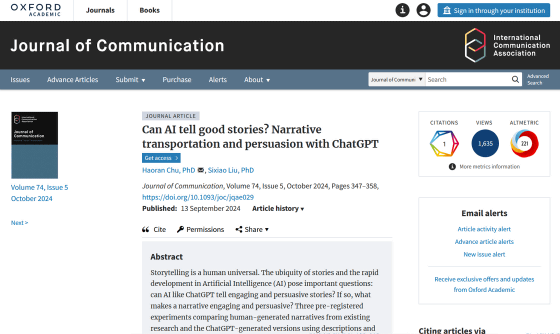It turns out that people have an instinctive aversion to AI-generated stories and find them less immersive than human-written stories.

In recent years, the development of generative AI has led to an increase in the use of AI in creative fields, but there has been a negative outlook for AI-based creations, such as
Can AI tell good stories? Narrative transportation and persuasion with ChatGPT | Journal of Communication | Oxford Academic
https://academic.oup.com/joc/article-abstract/74/5/347/7756907

Your next favorite story won't be written by AI – but it could be someday
https://theconversation.com/your-next-favorite-story-wont-be-written-by-ai-but-it-could-be-someday-239284
We are instinctively turned off by stories labeled 'AI-generated' — even if they were secretly written by other people, study finds | Live Science
https://www.livescience.com/technology/artificial-intelligence/we-are-instinctively-turned-off-by-stories-labeled-ai-generated-even-if-they-were-secretly-written-by-other-people-study-finds
'Stories define us and shape our relationships, culture, and society,' say Haoran Zhu , assistant professor of communication at the University of Florida, and his colleagues. 'Unlike other skills that have been replaced by technology, storytelling is uniquely human and separates humans from machines.'
However, in recent years, it has been said that generative AI with huge data sets can generate stories that are comparable to or even better than those written by humans, and people in creative professions see AI as a threat. In fact, Hollywood screenwriters and actors have gone on strike demanding 'regulations on AI that take away jobs,' and in November 2023, a tentative agreement was reached that included restrictions on the use of AI.
The fact that AI can generate persuasive stories not only threatens the livelihoods of creators, but also poses a societal risk to the spread of misinformation. Creating persuasive fake news by hand takes time and effort, but generative AI can generate fake stories in a blink of an eye. This is especially worrying because past research has shown that people are more influenced by stories than explicit arguments.

So Chu and his colleagues conducted an experiment to examine how AI-generated stories and human-generated stories affect people differently. First, the research team prepared two stories: one created by humans based on existing research results, and one created by ChatGPT based on existing research results.
In one experiment, subjects read stories labeled as 'written by AI' and stories labeled as 'written by humans.' The results showed that subjects were less immersed in the story and more critical of it than stories written by humans. This result was seen even when the actual author was human, as long as the story was labeled 'written by AI.' In other words, it was suggested that readers have an instinctive aversion to stories labeled as 'generated by AI.'
In addition, we found that human-written stories were more immersive than AI-generated stories, regardless of how the stories were labeled, suggesting that human-written stories are more compelling and engage readers. On the other hand, we found that AI-generated stories were just as persuasive as human-written stories.
Linguistic analysis of the stories showed that AI-generated stories tended to have longer paragraphs and sentences, while human-written stories had more stylistic diversity. The AI also showed stronger connections between sentences and ideas, and was able to write stories with a coherent tone, whereas the human writers described more diverse and rich experiences.
'People are put off by the idea that a story was written by an AI,' Chu said. 'AI is good at writing coherent, logical and coherent stories, but it's still not as good as humans at writing compelling stories.'

The research team says that there are four elements that make a story compelling: 'writing ability,' 'persuasiveness,' 'creativity,' and 'lived experience,' and that AI excels in writing ability and persuasiveness. On the other hand, they point out that AI only generates sentences based on predictability, so it lacks elements such as creativity and lived experience.
It is possible that AI will evolve to be able to generate more compelling stories in the future, but at least there is no risk that screenwriters and novelists will lose their jobs right now. However, if AI evolves to the point where it can create highly persuasive stories, it could be used to spread misinformation and cause serious problems.
Related Posts:
in Web Service, Science, Posted by log1h_ik







